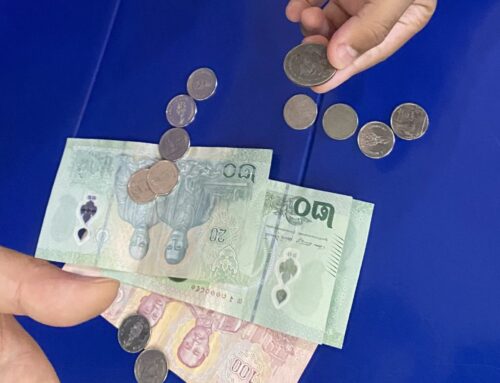Let’s Talk Numbers …
If you’ve been wondering whether teaching in Thailand is financially realistic, let’s cut straight to it — most teaching jobs in the Land of Smiles pay between ฿35,000 and ฿45,000 a month (roughly £750–£1,000). On paper, it might not seem like a fortune, especially compared to Western salaries, but Thailand plays by different rules. The cost of living is far lower, daily expenses are modest, and life outside of work is often richer in experience than anything money can buy.
Thailand isn’t a “get rich quick” move — it’s about living well while you teach, travel, and immerse yourself in a new culture. If you budget wisely and live like a local, that salary will not only cover your essentials but give you the power to live your best life in one of the most beautiful countries on earth.
Start Thinking in Baht …
One of the first mental shifts you’ll need to make is to stop converting the price of everything back into pounds or dollars. In Thailand, the baht is your new benchmark — and when you look at your expenses in local terms, you’ll see just how affordable life here can be.
Here’s a realistic monthly budget:
- Room or shared house: ฿5,000–฿8,000
- Motorbike rental: ฿5,000
- Eating out (local food): ฿8,000 (less if your school provides lunch)
- Bills (electricity, water, internet, phone): ฿2,500
- Petrol: ฿1,000
- Visa extension (averaged): ฿700
- Essentials (drinking water, laundry, toiletries/household): ฿1,200
- Flights & insurance: ideally bought before you arrive
- Subscriptions back home: worth considering in your budget
Rounded up, that’s about ฿27,000 on monthly essentials (if you’re rent is on the more expensive side). So even if you’re earning at the lower end of the earning scale (฿35,000 a month), you’d still have around ฿8,000 left — roughly ฿2,000 a week — more than enough to enjoy, save, or put toward trips and bigger purchases.
Of course, Bangkok tends to have slightly higher rents and day-to-day costs, but the same principle applies everywhere: think in baht, live within your means, and you’ll discover that a teaching salary in Thailand can stretch surprisingly far.
Thailand Won’t Make You Rich …
If you’re coming to Thailand with dreams of padding out your savings account or building long-term wealth, you might want to adjust your expectations. Teaching here is not about the money — and that’s not a bad thing. What Thailand lacks in fat pay checks, it more than makes up for in a rich and rewarding experience.
Every day has the potential to be special. You might start your day in the morning cool, weaving through quiet streets on your scooter, stop for a plate of steaming noodles at a roadside stall, and finish it watching the sunset from a hillside temple. Between the gorgeous weather, slower pace of life, and the chance to explore stunning beaches, mountains, and jungles on your weekends, it’s hard to put a price tag on what you’ll gain.
Then there are the relationships. You’ll meet fellow teachers from all over the world, make friends with locals who invite you into their lives, and form bonds with students that you’ll remember for years. These connections and experiences will shape your time here far more than your payslip.
Yes, you won’t be stacking up large savings every month — but you’ll be collecting stories, building friendships, and soaking up a culture that changes how you see the world. And in the long run, those are the kinds of riches that last a lifetime.
Live Like a Local …
One of the biggest mistakes new teachers make is trying to live as if they’re still back home. Imported food, Western-style apartments, and constant nights out at expat bars will drain your salary as fast as a blink. If you want your money to last — and get the most from your time here — you need to embrace living like a local.
Many Thais live on less than ฿10,000 a month, and even some of your Thai colleagues may be earning half your salary or less. They know how to stretch their baht without feeling deprived, and you can learn a lot from their habits.
A huge part of this is food. Eating local isn’t just cheaper — it’s one of the richest parts of the experience. A filling plate of rice with stir-fried vegetables or a noodle soup usually costs around ฿50, and local markets are bursting with fresh produce, snacks, and regional specialities. At first, ordering in Thai and trying unfamiliar dishes can feel intimidating, but it’s worth pushing through. Learning the names of dishes, figuring out your spice tolerance, and discovering new favourites takes time, patience, and a little courage — but the payoff is enormous.
Not only will your budget thank you, but you’ll also connect more deeply with the culture and the people. And when you’re tucking into a fragrant curry in a bustling market for a tenth of the price and ten times the flavour it would be back home, you’ll realise that “living like a local” is less about sacrifice and more about upgrading your life in a different way.
Learn to Save …
Living Thailand can feel like one long holiday — the warm evenings, the smell of street food, and the endless options for weekend getaways. It’s tempting to spend freely, telling yourself you’re here to make the most of it. But if you want your money to stretch, you need to shift from daily indulgence to purposeful spending. That means skipping the extra iced coffee or passing on the burger so you can put that baht toward something special.
Set a monthly savings target — even just ฿2,000–฿4,000 — and treat it as non-negotiable. Keep it separate from your spending money so it doesn’t get “accidentally” used. Over time, those small sacrifices add up to bigger adventures: a week on the islands, a trip to a neighbouring country, or a trek through the mountains.
Like we’ve already mentioned: one of the best ways to save here is by enjoying the simple, inexpensive pleasures that locals do every day. A ฿50 bowl of noodles enjoyed with some locals, an afternoon wandering the market, or watching the sunset over the rice fields costs next to nothing but adds so much richness to your life. When your day-to-day is already this satisfying, it’s much easier to tuck money away for the bigger trips.
By making a habit of saving, you’ll not only enjoy Thailand in the moment but also create unforgettable experiences that take a little more planning — and a little more baht.
Extra Work Helps …
While your teaching salary in Thailand can comfortably cover daily life, picking up extra work can make a big difference — especially if you want to build a safety net for the future. Just a few hours of tutoring a week can be pure profit and tucked away into savings.
Opportunities often start within your school — parents may ask if you offer private English lessons, or you could tutor students one-on-one after class. But always check your school’s policy first, as some are fine with it while others prefer you avoid tutoring their students without permission.
Online work is another good option. Teaching English to Chinese students in the evenings fits in well, with only a one-hour time difference. Many roles pay hourly — around £15 for Chinese students compared to roughly ฿500 (about £10.50) from Thai students. While the lower rate in Thailand can be easier to secure, the higher online rate can add up quickly. For example, just six-hours of lessons with Chinese students could earn you an extra £360 a month.
Think of this income as your “future fund.” While it’s tempting to spend it on nights out or travel — setting it aside can cover moving costs when you leave Thailand, ease a career change, or provide a safety cushion. A little forward planning means you can enjoy life here even more, knowing you’re ready for whatever comes next.
A Great Life Isn’t Expensive …
Your best memories in Thailand often won’t cost a baht. A picnic with friends under the shade of a lakeside tree. Playing volleyball with students until the sun dips below the horizon. Laughing over lunch with colleagues. Taking a morning walk while the neighbourhood dogs trot happily beside you.
Yes, it takes money to get here, but once you’re settled, a teacher’s salary can give you an amazing quality of life — thanks to Thailand’s beauty, simplicity, and low cost of living. The flashy, shallow things quickly lose their appeal. Instead, you’ll find joy in the everyday, save for the adventures that matter, and work hard while building skills that will stay with you for life.
And you could be starting as soon as October this year — check out our program page to make it happen and we’ll see you there!




